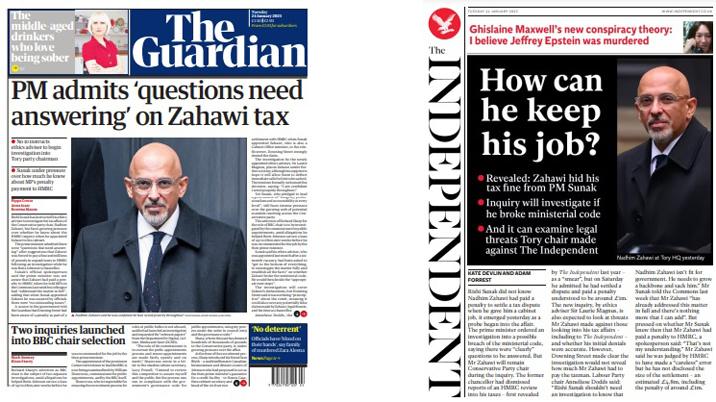
Zahawi & Sharp: Fleet Street’s differing approaches to gathering storm
Well, well! The BBC has woken up. Monday’s main television news bulletin not only led on Nadhim Zahawi’s tax tangles, but followed it up with concerns about the appointment of Richard Sharp as the corporation’s chairman.
In both cases, there had been a concrete development in stories that had been rumbling for days: Rishi Sunak calling for an ethics inquiry into Zahawi’s finances and another official investigation into whether the public appointments commission had had all the facts – most particularly whether Sharp facilitated an £800,000 loan for Boris Johnson – when it gave Sharp the BBC job.
It has felt this past week as though half the media has been holding up its hands in horror at “yet more Tory sleaze” while the other half has been desperately trying to look the other way. Certainly to the point of declining to do any original work on either story, preferring simply to report other news organisations – from the Guardian to the Sun – and the blanket denials and obfuscations from the central characters. And as far back in the book as they can get away with. If Zahawi does have to go, they will have a lot of catching up to do.
As the Prime Minister said – a week after telling MPs that everything was hunky dory with the Tory chairman’s tax affairs – Zahawi has a lot of questions to answer. And this Notebook is here to commend those who have been asking them for the past seven months – notably, the Guardian, Observer, Independent and the tax lawyer Dan Niedle – and in the face of threatening letters from Zahawi’s lawyers.
Even if Zahawi is eventually found to have done nothing wrong, there is no doubt that he has changed his explanations several times in the course of those few months and sought to stymie legitimate questioning of his financial affairs. An examination of these behaviours is very definitely in the public interest. The Sun realises this and has been finding new lines of inquiry while the likes of the Express and Mail look pointedly in the other direction.
Story, what story?

They have both been back on the “Boris is brilliant” bandwagon, with the Express splashing on his latest trip to Ukraine and the Mail with an essay from the man himself demanding that other countries send more tanks (remember this is the man who told the Commons defence committee shortly before the Russian invasion that the days of tank warfare were over). Still, he got his wish. Germany and America have come on board and the Mail is this morning claiming the credit, along with the former Prime Minister, for making it happen.
The Express and Telegraph have also been exercised by the Afghan convict who “sneaked” into Britain “to kill again”. Not a nice story. But I remain to be convinced that his explicit purpose was to come here in order to commit murder. Rather in the way of that sloppy construction of terrorists / killers / rapists / arsonists being bailed “to offend again”. Courts do not grant defendants bail in order that they can go out and carry out further crimes; they do so because they (maybe mistakenly) have been convinced that there is no risk to the public.


The story itself, however, was obviously worth the weight it was given across most of Fleet Street. A young man who had been rejected for asylum and convicted of a double murder in other countries arrives here by ferry and immediately claims asylum, insisting that he is only 14, when to most eyes he is much older. Our system gives him the benefit of the doubt, pending age checks, and he is housed with a foster family who are frightened of him. He subsequently stabs someone to death in the street. Lots of meat there in terms of hard news, human interest and policy.
As noted above, it made a splash for the Express and Telegraph, page leads for most of the rest, and a single in the Star. There was nothing in the Guardian. That was a big mistake. Maybe it was wearing its bleeding-heart-don’t-be-nasty-to-migrants hat. But while the anti-migrant tendency might use the story as ammunition, there was more to this case than that. Think in terms of white Englishman previously convicted of double murder fatally stabbing someone over an e-scooter. Still newsworthy. Not being racist is understanding that people of other backgrounds can be bastards too. It’s about the individual, not their race, colour or creed.
If the Guardian needs a lesson in how to tell the story without demonising asylum seekers, it should look at the Mirror, with its perfectly reasonable heading: “Asylum seeker who stabbed Marine in row over e-scooter had killed two people before arriving in UK”. No sneaking or cheating, just the facts of the crime.
This story appeared on page 19 of the Mirror, four spreads back from “Failures that left predator free to kill Zara” (more applause for not falling into the trap of his being “freed to kill”). We have looked at this story before and Tuesday’s treatment of the official report into probation service failings could be regarded as going over old ground. As a quick reminder, Jordan McSweeney had been freed on licence from jail, the decision was reversed and he was being sought for recall when he attacked and killed Zara Aleen as she walked the last few yards to her home in Ilford.
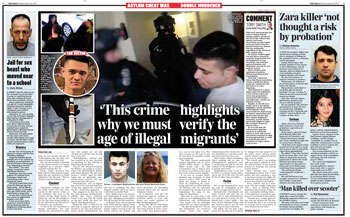
The Telegraph made a big thing of the probation failings at the time, so perhaps it’s understandable that it was less enthused this time, putting the report underneath the inside coverage of Lawangeen Abdulrahimzai, the killer Afghan. The Express took a similar approach, running McSweeney as a double on the Abdulrahimzai spread. The Mail had the asylum-seeker on 10 and 11 and McSweeney on 21. The Times and Sun both gave the triple killer a page lead – in the Times’s case coupled with a people-trafficking story – but ignored the probation report.
Now the thing here is that both were stories – scandals, if you like – of officialdom in this country failing to protect the public. The greater failing probably lies with the probation service because of the wider ramifications – I would surmise that there are probably more potentially dangerous prisoners let out on licence than there are murderous asylum seekers roaming the streets. Yet that story was treated by all but the Mirror and Guardian – which ran it as a page 11 lead – as less important or interesting, possibly because the basic facts were already known, possibly because of a “nasty foreigners” agenda.

Then, yesterday, the Mirror and Express came back with more – an interview with the chief inspector of probation, Jordan Russell, who was the author of the previous day’s report on McSweeney. This made a splash for the Mirror as “Deadly failings”, which reported that every six days, someone is killed by an offender on probation.
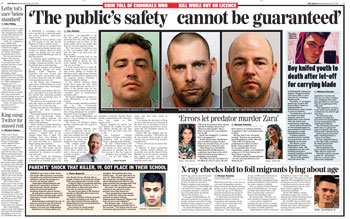
This story, by Tom Pettifor, was labelled an exclusive. Well it may have been to Pettifor, but not for the Mirror, since it also appeared in the Express. Both titles are part of the Reach group and “synergies” have led to more editorial material being shared. The Mirror presented the story as a justice scandal that needs to be addressed by the government, the Express as an admission that the public’s safety could not be guaranteed.
Both coupled the interview with case histories of other victims and a return to the killer asylum seeker. The Mirror, the most reluctant paper in Fleet Street to carry stories about the “migrant crisis”, reported that – just as the whitetops have been claiming for years – more than 400 criminals, including murderers, rapists and child sex offenders, have arrived and settled here over the past three years without the authorities knowing their backgrounds. To put that in perspective, that was almost exactly 1% of the people subjected to cross-border criminal checks. (That’s a rather smaller proportion than, say, the percentage of Met police officers now under investigation for sex offences – more than 1,000 in a 32,000-strong force.) Many had remained under the radar until they offended again and their previous history came to light. Which does beg the question, how many more go undetected?
These are issues that need to be addressed in a calm, rational frame of mind. Sometimes the papers with their anti-migrant outlook have a valid point to make. But it gets lost in the hysterical fearmongering. And we do need to have a look at our creaking justice system.
Caught on camera
A quick word about the week’s other criminal – our Prime Minister – and all those columnists complaining that police should have better things to do than to fine him for filming a video for Instagram while riding in the back of a car without a seatbelt on. What did they expect the police to do? It’s no good saying “But Blair, Brown and countless others did the same”. This wasn’t a snatch back-of-the-car shot catching a leader unawares. Sunak actually filmed himself breaking the law and then posted the resultant video on social media where it was seen by millions. It didn’t require hours and hours of valuable police time to issue a fixed penalty notice. To ignore the offence would only have brought further “one law for them, another for the rest of us” opprobrium. It had to be done.
Something-for-nothing Britain?

Every time I sit down to write a Notebook, I promise myself that I won’t get hung up on the Daily Mail. And then they go and publish a splash like the one on Monday and I can’t let it pass. “Shocking rise of ‘something for nothing’ Britain” it cried. That’s me they’re talking about. This really was a piece of work, based on research carried out by Civitas.
Civitas is one of many right-leaning organisations operating out of 55 Tufton Street. Reports emanating from the building tend to follow a “low tax, low immigration, low regulation” agenda and this was no exception. It concluded that more than half the population took out from the state more than they put in and that two-thirds of all income tax was paid by the wealthiest 20%. What was surprising was that the Mail felt the need to sprinkle fairy dust on this material to make it even more “shocking”.
The poorest fifth of households, it reported, received £17,600 more in welfare and “non-financial” benefits than they paid in tax. This, Tory MPs claimed, was a result of the pandemic “changing the psyche” of the nation so that people believed they could “get something for nothing”. Meanwhile, the finding that the top 10% of earners paid 53% of income tax showed that income tax had become a “stealth tax” on the wealthy. A stealth tax? On the wealthy? How can something that absolutely everyone knows about and understands be a stealth tax? And, yes, of course the wealthy pay more. That’s how it works. As Civitas accepts in its report.
I would imagine that quite a lot of people – especially those juggling two, three or four jobs on the minimum wage or less to make ends meet – would be surprised to learn that they received £17,600 a year from the state. And after quite a lot of muttering from Iain Duncan Smith and John Redwood, the story returns to the nitty gritty to explain that besides Jobseekers’ Allowance, Universal Credit and the state pension, the figure includes “non-financial” benefits, “such as use of the NHS and social care, free school meals and subsidised housing”. And education. Though that isn’t listed in the Mail. So not money in people’s pockets for sitting at home, then.
Money vs clapping
That inclusion of the state pension in the list is the only mention of the people who make up a good chunk of these societal freeloaders. There are 11 million pensioners. Like me. The vast majority of them receive more from the state than they pay in tax. Like me. Many of them are sitting in valuable houses with small mortgages so that they may be cash-strapped, but are asset-rich. Like me. And, according to the Mail, that’s quite right too. Remember the “Good news: triple lock to stay” headlines? The insistence that it was right for the likes of me to get an inflation-matching pay rise while those who, should I fall, might have to take me to hospital and care for me when I get there should not? Clapping is good enough for them.
Then there are the disabled and the sick who cannot work through no fault of their own.
So what is the solution to this “unsustainable” situation? The unemployment rate is at its lowest for fifty years (see the graph from Statista below). People can contribute more only if they pay more taxes. But the Mail wants to reduce taxes. So that means people need to earn more. But the country “can’t afford” to pay public sector workers more and thousands of small businesses are going bust, thanks to the pandemic, Brexit and the rising cost of living, making pay rises for many private sector workers unfeasible too.
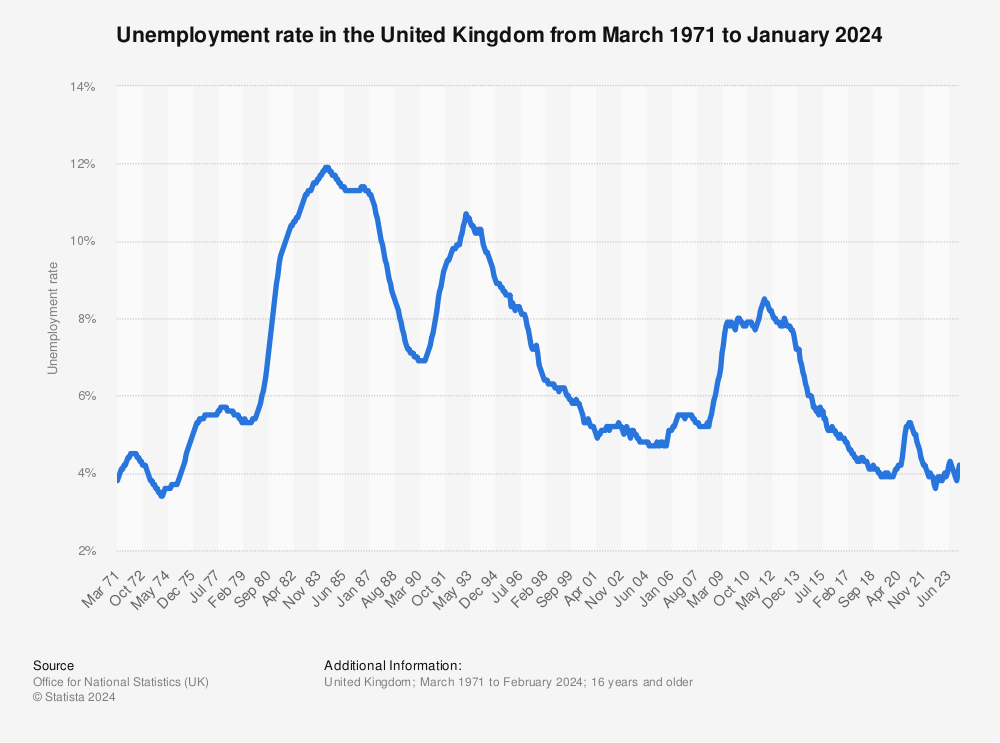
Like the MPs quoted in the Mail story, Civitas notes that the picture changed after the pandemic, with a number of people deciding to pack up work altogether – which is not the same as deciding to live off the state or opting for a “something for nothing” lifestyle. It is more likely to be a decision reached after calculating how much there is in the bank, how much you need to live on and what you are prepared to sacrifice for a less stressful pace of life than it is to be a choice to sponge off the rest of society.
Rich vs poor
You don’t have to be a rabid socialist to feel queasy at the implication that there is something wrong that the poorest people in society – yes, the Mail actually says “the poorest” in so many words – should be given a helping hand and that it is equally wrong that the richest – and, yes, it says that as well – should pay more. In fact, Civitas doesn’t say that. It also separates out the retired, which the Mail declines to do, and notes, as the Mail does not, that the poorest spend twice as much of their money on council tax and five times as much in VAT as the richest.
The headline fact of this research is that the “net dependency ratio” is now at its highest level on record, with – by this system of calculation – 54% of people getting more from the state than they put in. But the “new” bit for Civitas is that the 13 million people slap bang in the middle of the range from poorest to richest are for the first time receiving more in cash and benefits in kind than they pay in taxes – just under five grand’s worth. This doesn’t get a mention in the Mail story, although the figure for the “average” household is included in a side panel. That seems a bit strange, since the Mail claims to speak for Middle England and you might have thought that people earning around £42,500 a year on average might just be its core readership.
Oh. Silly me. It’s not our readers who are at fault here. It’s those other people.
Tax cuts, how exactly?

This was just a further instalment in the Mail’s renewed demand that taxes should be cut. You might have thought that the Truss-Kwarteng fiasco would have left it chastened, but no. It’s back banging the same drum, with Monday’s story the third lead in a week on the same theme. Yesterday, it was at it again, leading on “appalling” data showing that the national debt had hit £2.5trn and calling for an urgent plan for growth – with Redwood and Duncan Smith both back again, again calling for tax cuts. There was the prospect, it also reported, that the retirement age would have to rise to 68 by 2035, which former pensions minister Ros Altman described as a “blunt tool” that would heap hardship on the vulnerable, while another small story noted that death duties were going to “soar” with families paying a record amount in inheritance tax. This was told completely straight, but you can’t help feeling the paper doesn’t regard this additional income for the country as a positive.
Indeed, turn to the leader and it talks about the state “grabbing” inheritance tax, and about people being “dragged” into higher tax bands through the freezing of thresholds.
So, it worries about a dependency culture with people taking out more than they put in, but it doesn’t want people to wait longer for their pensions and it doesn’t want the Treasury to take so much in tax. It also wants police to turn out to every burglary, for public services to improve (presumably through efficiency savings – certainly not by recruiting staff by offering an attractive employment package) and wonders “where have all our GPs gone?”
Meanwhile, greedy nursing agencies are “leeching off the NHS”. (The leading health locum provider is, incidentally, owned by Michael Ashcroft, whose literary collaborations with Isabel Oakeshott are enthusiastically serialised by the Mail.) And while it’s all right for some people to earn bucketloads of money and be shielded from having to give too much of it back, that does not include anyone paid from the public purse. Anyone earning even half as much as the Mail editor is designated a “fat cat”.

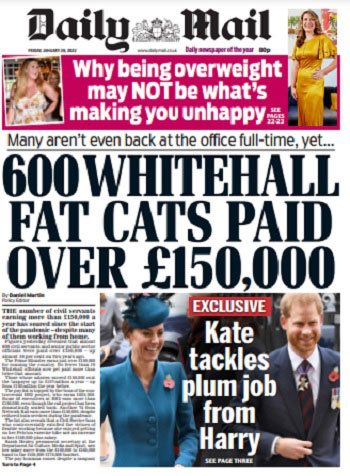
How, exactly, does the Mail envisage squaring this circle? According to yesterday’s leader (which referred back to Monday’s story), by telling the “army of idlers” to start pulling their weight. Is it possible, it asks, that 2.5m people are incapable of doing any work at all or have they become accustomed to a life on benefits?
I don’t know where that 2.5m figure came from – it does sort of ring a bell from when Priti Patel was talking about the “economically inactive” a while back – but I do wonder how such a small percentage of the population returning to what would most likely be low-paid employment are going to solve all our problems, while everyone else pays less tax, retires earlier, and passes on more of their wealth to their offspring rather than share it with wider society.
Poor journalism
But I’m not an economist. I’m a journalist and my beef with the Mail’s coverage of that Civitas report is not the conclusions that it drew – however much I may disagree with them – but the fact that it just wasn’t journalism. It took a report from a rightwing thinktank and then presented selected nuggets with quotes from three rightwing Tory MPs to reinforce the message. There was no attempt to look at the situation in the round, to put the new material in the context of other readily available data – such as the distribution of wealth in this country, the numbers of disabled, long-term sick, the unemployment rate, the state of the jobs market, labour shortages, pay scales – or to seek any other voices, whether from experts in these fields, economists or opposition politicians. This was the ultimate in confirmation bias and a thoroughly shoddy exercise.
To be fair, no one else did a brilliant job. The leftwingers ignored the research altogether, the Telegraph and Express both reported the Civitas analysis and reached verdicts similar to the Mail’s – albeit conveyed through their comment columns, rather than in a screaming splash headline. The Times had no room in the news pages but gave one of the report’s co-authors, Tim Knox, the Thunderer column to project his wares.
There is no doubt that a society where there are more takers than givers is in peril, so the research was worth considering and reporting. But some might say that one where the richest 1% are wealthier (with £2.8trn between 685,500 – more than enough to settle the national debt) than 70% of the rest of population put together (48m with a combined wealth of £2.4trn) also has some questions to ask of itself. And I would venture to say they do not include, “why are we taxing the 1% so harshly?”

A decade or so ago, the whitetops were awash with stories about “benefit scroungers” (ultimately personified by “White Dee” in the TV series Benefits Street): feckless families with too many children they couldn’t look after. A shameful example of this was the Mail’s splash headline when Mick Philpott was convicted of killing six of his children by setting fire to his house. By any measure, Philpott was a nasty, violent sponger, but to attribute his behaviour to the welfare state rather than his personal failings was to tar everyone needing support with the same brush.
Then immigrants became the whipping boys and girls, stealing our jobs and driving down wages while simultaneously living off our benefits. It didn’t take a genius to predict that if Brexit brought the desired reduction in immigration, new scapegoats would be found for society’s ills, with those on benefits the most likely targets. As we have seen, immigration hasn’t fallen. But it does seem that the old villains are finding their way back into the crosshairs.
PS: The Mail might also consider that some of those "idlers" would like to go to work but can't afford to – as this Twitter thread by Sara Benwell spells out so clearly.
Lots of people talking about cost of nursery fees. We’re grappling with this at the moment.
— Sara (Thundercats) Benwell (@sarabenwell) January 26, 2023
There’s one nearby that cost £71 for a HALF day. Full time £113.60.
That’s £1,420 for 4wks half days £2,272 for 4wks full time.
Approx £18,460 part time annually. Or £29,536 full time
In short, the median wage after tax is about £26,000, full-time childcare can be up to £30,000. So, as she points out, it’s not just the poor who can’t afford it.
And yes, the Mail is traditionally in favour of stay-at-home mothering. But shouldn’t they also be up and out to work contributing to the economy so the entrepreneurs and wealth makers don’t have to pay so much tax?
Front page of the fortnight
Very neatly done.

Liz Gerard’s Notebook is a fortnightly column published in the InPubWeekly newsletter. To be added to the mailing list, enter your email address here.












